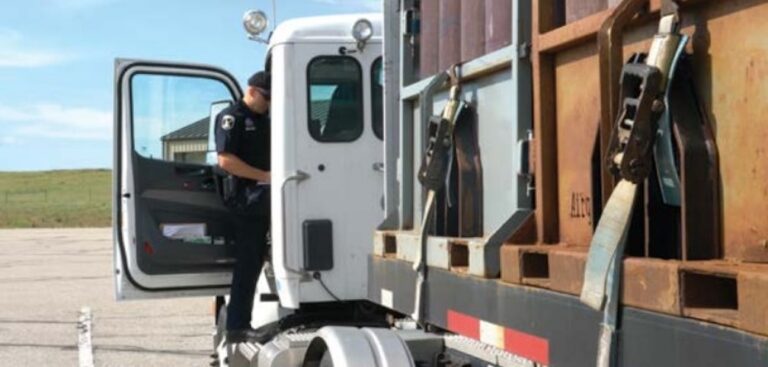This year, the Commercial Vehicle Safety Alliance (CVSA) will once again be working to make the roads safer for everyone this year. However, because the CVSA members that drivers come in contact with are usually law-enforcement officers, many drivers have misconceptions about the organization, its purpose and its membership. The CVSA website describes the alliance this way: “a nonprofit organization comprised of local, state, provincial, territorial and federal commercial motor vehicle safety officials and industry representatives.” Those “industry representatives” include carriers, manufacturers, educators, suppliers, vendors, schools, insurers, trucking associations and more.
More than inspections
Although vehicle inspections are only part of what CVSA does, they are involved from beginning to end. Long before an inspector crawls under a truck, the CVSA has defined what should be inspected, how the inspection is done and what criteria are used to determine if a defect exists. That’s why an inspector on the plains of Saskatchewan performs the same inspection as the one at the scale house in Grovetown, Georgia, Ellsworth, Maine or even on the side of the road in Samalayuca, Chihuahua Provence, Mexico. Local and regional laws may specify additional items to be checked, but the CVSA checklist ensures that specified items are checked in the same way.
The CVSA conducts workshops and conferences throughout the year that bring together experts from across transportation to review inspection lists and procedures, modifying current processes and creating new ones when the need arises. Training is provided for technicians and inspectors, and an annual North American Inspectors Championship pits the best against their peers. CVSA also develops standards and conducts training for Hazardous Materials hauling, storing and tracking crash investigation information, and development of instructors in the process.
The CVSA events that most drivers are interested in, however, are those that focus on truck and driver inspections that are likely to result in being selected for inspection. Many drivers dread events like International Roadcheck, an annual 72-hour inspection blitz across North America in which thousands of vehicles are inspected. During the 2024 event, nearly 49,000 inspections were conducted in which 23% of vehicles and 4.8% of drivers were placed Out of Service (OOS).
The odds of being delayed for an inspection or placed OOS for a failure are enough to cause many drivers to simply shut down during that week. Some schedule vacations or time off, while some simply park their trucks until the event is over. So many trucks are removed from the road that freight spot rates are impacted, rising in response to the increased competition for trucks to move shipments.
But removing unsafe vehicles and drivers isn’t the only benefit provided by the Roadcheck event. In preparation for being inspected, carriers and drivers pay closer attention to the condition of their vehicles. More annual and pre-trip inspections are performed and repairs made prior to the CVSA event. Everyone becomes more aware of truck safety and the need to be diligent about keeping equipment in top condition. The publicity helps educate the general public about trucking and efforts to make the industry safer.
What is in store for 2025
The 2025 International Roadcheck is scheduled for May 13-15. For each year’s event, focus areas are specified, but they have not yet been released for this year’s event. Another annual CVSA event, Operation Airbrake is scheduled for August 24-30, 2025. Additionally, an unannounced, one-day initiative will be conducted on an unspecified date. This event focuses on an area of truck inspections that is frequently cited for violations. During the 2024 event, nearly 17,000 vehicles were inspected with 12.8% of them placed OOS for brake or other violations. Operation Safe Driver is another annual CVSA initiative, one that focuses on drivers of passenger vehicles as well as trucks. The program addresses the high number of traffic crashes that are caused by driver actions, estimated to be about 94% of all crashes. Education of drivers is a primary goal of the event, which helps make drivers of smaller vehicles more aware of techniques for sharing the road with trucks. Public service announcements (PSAs) in the form of short videos are distributed to media outlets to help educate the public and other materials are given to educators of teens and new or inexperienced drivers.
During the 2023 event, officers issued 2,634 citations (plus 4,592 warnings) to commercial vehicle drivers and 1,860 tickets (1,164 warnings) to passenger vehicle drivers. Results of the 2024 event have not yet been published.
Drivers can help eradicate a critical issue
While these CVSA events help focus attention on common inspection and traffic issues, they certainly aren’t the only contact drivers have with CVSA. Any official inspection, whether referred to as a DOT/FMCSA or other inspection, is most likely performed using the CVSA checklist, recorded on a CVSA form and submitted through a CVSA process. One CVSA campaign that drivers may not be aware of is its annual five-day Human Trafficking Awareness Initiative. The Alliance teamed up with TAT (formerly Truckers Against Trafficking) to distribute educational materials to carriers, drivers and other interested parties. The two groups worked together to produce human trafficking videos to be aired on Pluto TV, Paramount+ and other streaming services. While many drivers are aware of prostitution around truck stops and other areas where trucks gather, they may not understand that many of those who participate are coerced into the trade by traffickers.
Drivers who suspect human trafficking is occurring are encouraged to call 911 for intervention by local police. The U.S. National Human Trafficking Hotline is available 24/7 at 888-373-7888 for reporting, however, another call would need to be made to alert local authorities.
When it comes to inspections and dealing with law enforcement, each driver’s attitude is different. But knowing that CVSA membership lists may include your hometown police, the carrier you drive for, the people that built your truck and an organization or two that you support might help change the “us vs. them” narrative. After all, we’re all on the same team — and that’s a point worth driving home.
Cliff Abbott is an experienced commercial vehicle driver and owner-operator who still holds a CDL in his home state of Alabama. In nearly 40 years in trucking, he’s been an instructor and trainer and has managed safety and recruiting operations for several carriers. Having never lost his love of the road, Cliff has written a book and hundreds of songs and has been writing for The Trucker for more than a decade.















